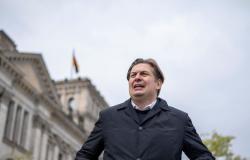Seven Patriot air defense systems. One for every major city in Ukraine. That is what his country needs most at the moment, says Dmytro Koeleba (42), the Ukrainian Minister of Foreign Affairs. “That is sufficient to protect the citizens and civilian infrastructure in those cities against daily attacks by Russian ballistic missiles. It is very simple: we must protect our energy supplies, for the benefit of citizens but also to keep the economy running. Otherwise we will have no money to defend our country. Seven Patriots. What is the power of the West if they cannot deliver that?”
The capital Kyiv is relatively well protected by the few Patriot systems that Ukraine already has. Koeleba does not want to give the exact number, the enemy does not need to know that. The missiles for the American Patriot batteries are not cheap: one missile costs 4.1 million dollars (3.8 million euros). But recovery is more expensive than prevention, says Koeleba. “Rebuilding a power plant costs $90 million, a hospital $20 million. Even if it were just about costs, this is a good choice.”
Ukraine’s second city, Kharkiv in the northeast, has suffered heavily from recent Russian missile attacks. A large power plant has been destroyed, power is very limited. International media pays little attention to the situation in Kharkiv. “That’s right, everyone prefers to write about war fatigue, or about arguments between our political and military top. I don’t understand that. Sorry, maybe I should be more diplomatic.”
Dmytro Koeleba, diplomat since 2003 and minister since 2020, is in a permanent split. On the one hand he is grateful for Western support to Ukraine, on the other hand he is frustrated about delayed arms deliveries and political discussions. The fear of not appearing grateful enough recurs regularly during the conversation in The Hague. But the support is there “too little too late”.
Also read
The Taurus missile could be crucial for Kyiv. What makes the weapon so popular?
Unlike many other close associates of President Volodymyr Zelensky, Kuleba was not dismissed in wartime. He has been traveling to world cities for two years to ask for support. At the end of last week he was in India, on Sunday and Monday in Kyiv. On Monday evening and night he traveled to The Hague, where he spoke on Tuesday at an international conference on legal prosecution of Russian aggression. On Wednesday and Thursday he will be at NATO in Brussels, where he will speak to twelve colleagues, among others.
Apart from traveling, the balance between showing gratitude and swallowing frustration seems very tiring. How do you keep that up?
“I take pills and I go to the gym. What also keeps me going is something I learned from world history books that I enjoy reading. Ukraine has gained international support faster and more than other countries that were previously in the same situation. That is progress for the world community. But hey, try saying that to the mother of a fallen soldier.”
Historically it is a lot, but at the moment international support is faltering. What can you do about that?
“My job is to look every day for solutions that allow us to move forward. Our partners are helping us in ways that make it impossible for Russia to completely destroy us. But they are not helping us in a way that will allow us to win this war and end war in Europe. Because that’s how it is. If Ukraine wins this war, there will be no war in Europe for decades. If Russia wins, a bigger war in Europe will follow. I know that when I say this, the next day someone from some country will always turn up and say that they don’t see Russia preparing for a war against NATO. That’s fine, but I’m trying to show everyone that no one believed there would be a large-scale invasion of Ukraine.”
How big is the gap between rhetoric from Western government leaders and actual support, between promises and deliveries?
“That is a provocative question. But indeed, there is a gap. This applies more to time than to size. The period between a commitment and the actual delivery of weapons is sometimes very long, unfortunately. But eventually they will be delivered. The most notorious example of a broken promise is of course the EU’s one million grenades. But I don’t want to blame the EU too much, we have already done that.
“War is largely about timing. If you need ten thousand grenades today and you don’t get them, you might need twenty thousand. Our biggest problem is, and please say that we are very grateful for everything we get, that politicians make a decision about the delivery of something and then sit back satisfied. So, we did that, we are the good guys. But that’s not how war works. The situation changes permanently and you have to make a new decision every day.
“Take the Czech initiative to supply eight hundred thousand grenades, with financial contributions from many countries. That’s very nice and it seems to work. We really need those grenades. But, and I don’t want to sound mean, I say to every European colleague I speak to: forget your satisfaction with the Czech initiative and immediately switch to the next good plan. Unfortunately, political decision-making does not work that effectively.”
US aid to Ukraine is being seriously delayed by resistance from some Republican politicians. How do you prepare for a possible victory for Donald Trump?
“Predicting is not my job, but I don’t think the United States will stop supporting Ukraine. I do think that the form and extent of that support may change as a result of domestic political differences. Trump wants to do the exact opposite of what President Biden is doing. You already saw this with his proposal to convert donations into loans. He does not say: I am not going to help Ukraine anymore. Whatever the outcome of the US elections, it does not mean we have to make concessions. Things may change in the US, but Ukraine’s strategic goals remain the same.”
How do you explain that many people in Western Europe do not take Russian aggression seriously?
“Since 1945, generations have grown up here with the idea that there will never be war again. The wars that followed, in Yugoslavia or Georgia, felt far away. They did not see that a regime was developing alongside Europe as the antithesis of Europe. Putin created an enemy image that made it possible for state TV to talk about destroying cities. Anyone who thinks that they are only talking about Ukrainian cities is wrong, it is also about Warsaw and Amsterdam.
“It would be good if Dutch people had more access to Russian propaganda on state TV, both the talk shows and the interviews with people on the street. Then you will understand better why ordinary Russians in our country rape, torture and murder people. Those people were not born that way, but grew up with hatred.
Also read
“Putin will start a new war again and again,” say two Russian dissidents
“Putin’s goal is very clear. He wants to restore not only the Soviet Union but the entire sphere of influence of the Soviet Union. Remember that the Soviet Union under Stalin was the best period for Russia, with influence in Eastern Europe, as well as in decolonizing countries in Africa and South America. Also remember that Russia is the only country never to have been held accountable for crimes committed in the Second World War. No tribunals, no punishments, no self-reflection. That says a lot about a country.”
To share
Email the editor







